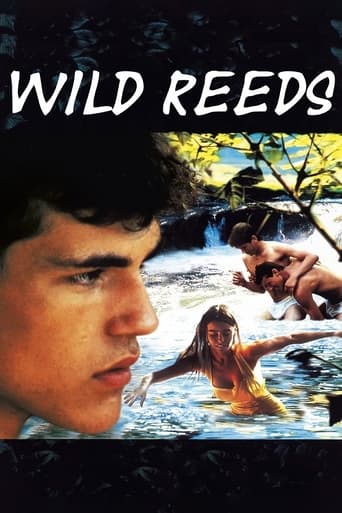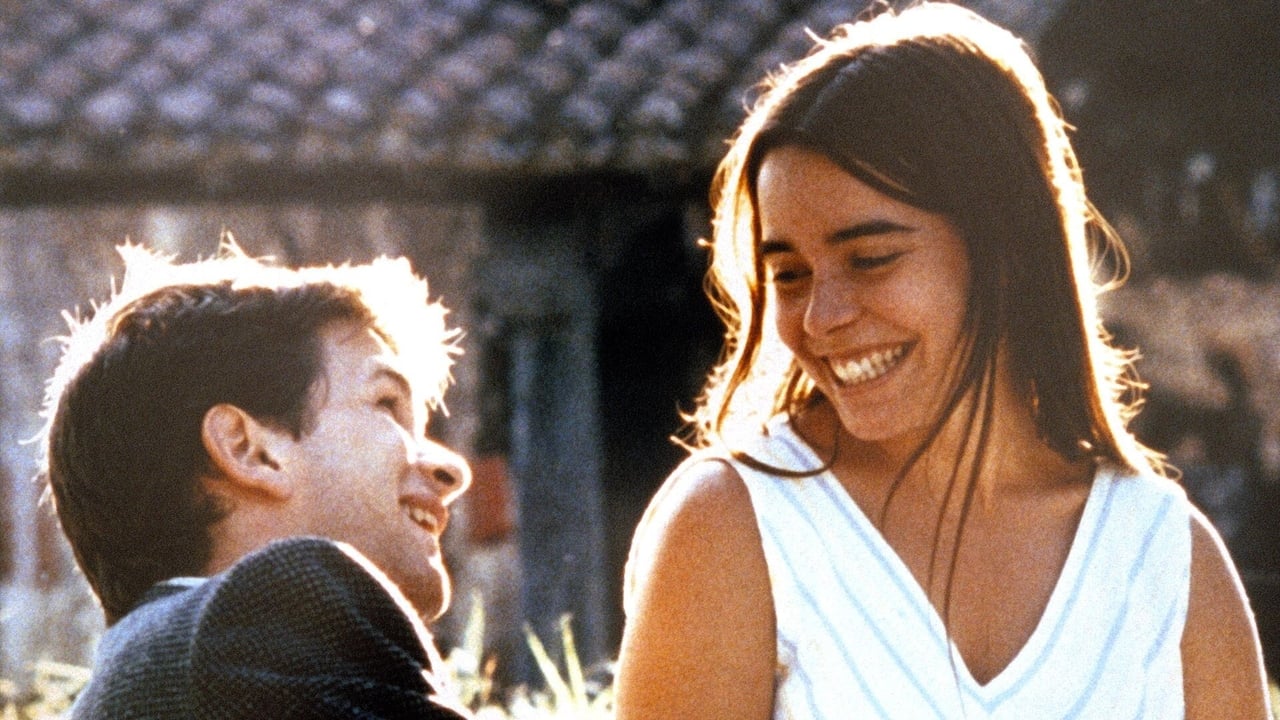Arcadio Bolanos
In the past, director André Téchiné has relentlessly pursued complex subjects. His films don't pander to the audience, nor do they allow the public to be emotionally detached. In "Les Témoins", for instance, AIDS is understood not as a simple disease but as something that profoundly alters social discourse and human interaction.In "Les Roseaux Sauvages" there is an immanent bellicosity among France and Algeria which lingers on in the background long enough to affect the protagonists. At the beginning of the film a wedding becomes the scenario in which we observe Serge's brother clumsily plotting how to desert from French troops, while François is idly chatting with Maïté, a girl he doesn't love but dates nonetheless. The war strongly infiltrates the world of these youngsters, as a new student arrives to the boarding school attended by Serge (interpreted by Stéphane Rideau in what would be the first of many gay related productions) and François (interpreted by Gaël Morel, director of several films of gay interest), an older boy named Henri that has experienced the aftermaths of the armed conflict in the flesh.After a couple of visits Serge pays to François in the middle of the night, the two boys soon become friends, but not before sharing some intimate secrets and practicing mutual masturbation and sexual intercourse. Of course, for Serge this one night stand is the product of revolting hormones and teenage horniness, but for François this moment changes everything: he will come forward to Maïté and from that moment, what at first seemed a typical high school relationship, is utterly modified.It's not long before Henri finds out, quite easily, about the sexual escapades of the two boys, but seems preoccupied only with the development of the war. Henri is unable to come through a normal grieving process regarding his father and the Algerian reality. The need for a symbolic death becomes patently necessary for Henri. Jacques Lacan defined the symbolic death as a narrative of closure, as the final sentence one must utter in order to let the dead ones go. If every culture in the planet respects some sort of funerary rites it is precisely because of that. The real death comes naturally when a heart stops beating, but the symbolic death is something cultural, something that depends on any given individual and the ability to cope with loss. Coming to terms with death means to be able to write that epitaph in our head, to be able to understand someone else's life and then to let go of it.Serge, on the contrary, will eventually accept the casualties of war, and instead of being paralyzed by death he will keep moving on. When Maïté's mother suffers a psychological breakdown after hearing about the demise of one of her students, her daughter feels devastated. None of this matters to François who's having a hard time understanding his own sexuality. A most relevant moment takes place when he confronts his image in the mirror and starts repeating "Je suis pédé", ashamed of being gay. This degrading word will lead to the reformulation of the object of desire, according to new terms and surpassing the phallic response; François's desire will be inextricably linked to the question of the desire of the other in its ethical dimension insofar as it bears the possibility of alterity, of authentic otherness. Of course it's never easy to be young and gay, but it's even more difficult in an isolated French province in the early 60s. It is then that Maïté's emotional support proves to be fundamental for François, as he will comprehend that his initial object of desire may well be out of his reach.The characters of the film adopt contrasting postures. Serge and François possess an adaptability and flexibility that will become indispensable. Henri and Maïté, however, are determined and stubborn individuals. Henri's teacher tries to make him understand that being strong like an oak is a disadvantage as oaks break when the storm comes, only reeds survive the storm because they bend but do not break. Drawing a divisor line between war and sexuality, Téchiné finally gathers the three boys and the girl in one final sequence that instead of focusing on the cliché of hope is centered on the pervasive reiteration of uncertainty and friendship.
Herag Halli
I am still asking myself as to how and why I ended up getting this movie from Netflix. There is nothing to see for an intelligent viewer. Stupid idiotic teenagers wander aimlessly in the French country side with one kid clutching his radio for good part of the movie. They are all effete looking and talk gibberish (atleast from what I read in the sub-titles.) The movie is a bore and lacks any kind of continuity that is sign of a good film maker. The class room scene is the most boring piece of movie I ever seen. These French Films are overrated by these French Media Morons here to reffered as morons for brevity, who probably have never seen non French films since they are narcissistic and don't know or don't care there is life outside France or outside of French films. Quite a bunch of useful and strange idiots. To the credit of this movie..the cinematography is breathtaking specially the canal scene and the greenery of the countryside.
alexandre-extra
«Les Roseaux Sauvages» (in Portuguese, «Juncos Silvestres») isn't just an ordinary film about the awakening of adolescence: it is a romantic treatise, an unforgettable example of delicacy and fidelity in the approach of such sensible themes such as the sexual ambiguity in adolescence and, above all, the love as a superior statement, domineering - even metaphysical. Although I haven't seen much of Téchiné (I saw, besides «Les roseaux sauvages», the movies «Loin», «Les égarés», and the recent «Les temps qui changent»), I believe that, to the date, this is without a doubt his best film, the most ravishing.Téchiné tells us the story of four teenagers: François Forestier (interpreted sublimely by Gaël Morel in his eternal look of sweet innocence), Serge Bartolo (interpreted by Stéphane Rideau, the eternal seducer confirmed later in «Loin», «Presque Rien», «A toute vitesse»...), Maïte Alvarez (interpreted by the well known Élodie Bouchez) and Henri Mariani (Frédéric Gorny).The film starts with François talking to Maïte about the movie «Såsom i en Spegel» (that reports us to the idea of 'search for the real truth'), from the Swedish director Ingmar Bergman, although that isn't said. Truly, the entire film is the search for the truth by the 4 teenagers.François is Maïte's boyfriend, although that relationship is more of a platonic protection against adulthood pressures than a physical passion. At the same time, François, Serge and Henri study in the same masculine boarding school, where they share rooms. Serge, in his sexual ambiguity, desires Maïte and at the same time seduces François, and ends up having sex with him. From that day on, François faces the homosexual desires that he had yet not perceived, while he falls in love for Serge and feels excited by Henri. On its turn, Serge, although always hesitant, breaks the relationship with François to search a more peaceful village life, next to any woman that fulfills his needs. The scene where Serge first breaks with François is brutal and pungent. François, always interpreted as the most fragile and delicate of the four, meets Serge while the last is walking to the river to drown his cat's cubs. At the same time that he tells François (always sensitive) in cold blood that «they are not good for each other», he throws the innocent cubs into the river. For the first time in his life, François' heart is broken, in a scene that reminds us the archetype «the lost of innocence». From that moment on, François is always searching for fortuitous encounters with Serge, living as, in his own words, a «thieve stilling moments»: one time he travels in a motorcycle hugging Serge, in another time he sleeps next to him, etc. The scenes in the classroom are bright, solar, reminding the purity of childhood; and alternate with the scenes taken place at night, that are incredibly sensual. François is also portrayed as an intellectual that reads Jean-Arthur-Nicolas Rimbaud, a homosexual writer revolted against the world, that leaves everything to live with the also writer Paul Verlaine, while he was still a teenager. That is what François wants to be.Maïte, on her side, is a communist that, after knowing about François passion for Serge, is jealous, but finally realizes the true platonic nature of her relationship with him. After a while, she falls in love with Henri, a pied-noir (French born Algerian) teenager revolted against the situation in his native country. He is also in love with her, although ideologically they are rivals. And this is why love, in this film, is taken as a superior and dominant statement: it surpasses all human ideologies, even the most complex and rooted ones; it surpasses intellectuals who read Rimbaud and even the most practical persons. The action takes place in 1962, at the same time as the Algerian crises, that is not exploited, although, to a certain pace, it is. The soundtrack confirms the excellence of this film, with Chubby Checker giving a sixties atmosphere, and the Adagio for string by Samuel Barber yielding the dramatic dimension that the film deserves, like in the highly stylized scene where Henri his sleeping by the river, or when François travels in the motorcycle hugging Serge.In the end, François meets a shoe salesman that everyone knows his a homosexual, in a scene that represents the almost desperate search for a way to destroy the lowliness, incomprehension, and lack of role models that are destined by his sexual orientation. Although he doesn't find the answer for his problems, because there isn't one, François remains optimistic − and this is another lesson that this film teaches us: to stay in the fight, always optimistic in a future happiness.This is one of those movies where I would like to penetrate and live in forever, between Maïte, Serge, Henri and, above all, the character unifying the destiny of the four, François, 'searching the truth'. I have seen films in the come-of-age theme, but this remains my favorite. Some good ones are «Presque Rien» (with Jérémie Elkaïm and Stéphane Rideau), «A cause d'un garcon» (also with Jérémie Elkaïm), «Maurice» (based on E. M. Forster homonymous work) and «Beautiful thing».It remains to be said that this film won four César (in the Cannes festival): best film, best director, best script and best actress-revelation for Élodie Bouchez.
caspian1978
The ending sums up the entire movie. Exiting the Garden of Eden, these 3 strong, yet weak teenagers find themselves lost among the world. Sexually, they have somewhat of a clue what they want and don't like, but by the end of the movie, we are left with something of a complex conclusion. All three have an idea who they are. Even though they are still lost with no one to talk to, they find there way out of the Garden of Eden and back to the World where they belong. The movie ends with hope.


 AD
AD



